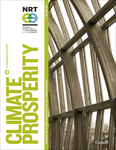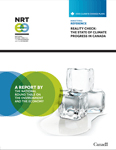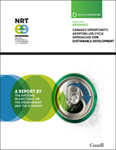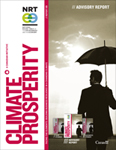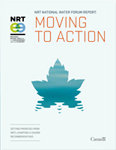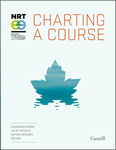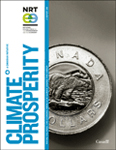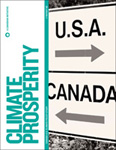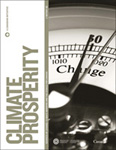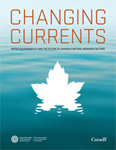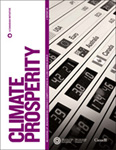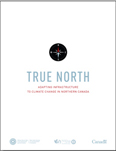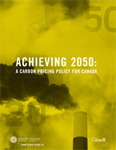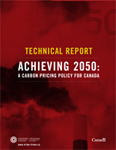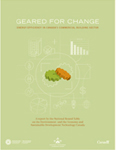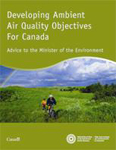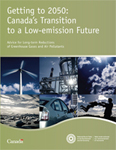News Release – May 30, 2003
Ottawa’s fiscal approach hurting environmental quality of Canadian cities
Smart spending reforms could trigger “tremendous positive contribution”
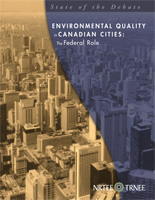 May 30, 2003 — The Federal Government’s policies affecting cities are unfocused and in need of reform, the National Round Table on the Environment and the Economy said in a new report released today in Winnipeg.
May 30, 2003 — The Federal Government’s policies affecting cities are unfocused and in need of reform, the National Round Table on the Environment and the Economy said in a new report released today in Winnipeg.
Ottawa’s policy influence on cities – development is largely unintentional and often runs counter to sustainability objectives, said the report entitled Environmental Quality in Canadian Cities: The Federal Role.
“The federal government could demonstrate leadership and make a tremendous positive contribution to the health and wealth of our cities by coordinating its tax and spending policies using an environmental focus,” said Michael Harcourt, Chair of the Round Table’s Urban Sustainability Task Force, in his first major public appearance since his accident last fall.
“In many cases, we’re not talking about taking in less revenue or spending more money – we’re talking about moving tax burdens from green economic activities to unsustainable activities, with investment shifted in the opposite direction,” he said.
More Canadians are living in cities. Environmental quality is an important element of the overall quality of life. Furthermore, urban environmental quality plays an important role in attracting and retaining the talent that drives wealth creation.
But most key indicators suggest negative trends in Canada’s urban environment, the report said. Population densities are declining from more than 1,000 people per square kilometre in 1971 to 800/km2 in 1996, as urban sprawl continues to chew up farmland. Car use is up and transit use down. Smog levels are increasing.
Sprawl-generated rising levels of traffic congestion are increasing costs to business, reducing productivity and impeding trade, particularly in the GTA and Vancouver.
Planning has thus far failed to tame urban sprawl and move people from cars to transit. “One important yet commonly overlooked cause of this failure is the inadvertent undermining of urban planning by the fiscal policies of all three levels of government,” the report noted.
The report recommends that Federal infrastructure funding should be granted only for projects where the municipality can identify and quantify expected improvements to environmental quality, such as better air or water quality.
In addition, a 100% GST rebate should be granted for green infrastructure projects such as public transit, water and sewage treatment plants, renewable energy generation and community energy systems, the report recommends.
“Urban environmental quality can be greatly improved through federal fiscal policies that address the interrelated issues of transportation and energy use,” said David McGuinty, President and CEO of the Round Table.
The report recommends that Ottawa allocate $1 billion a year for a decade to support transit in growing urban regions where there are opportunities to discourage sprawl and increase transit ridership.
The funding should go only to municipalities that adopt policies that encourage land use patterns that support transit use. Funded cities should be required to charge less for transit-accessible development when setting property taxes, user fees and development charges, the report said.
“Shifting from automobile travel to transit will likely have the single greatest impact on the environmental quality of Canadian cities and their effect on the global environment,” Mr. Harcourt said.
Among the report’s other recommendations to the Federal government:
Individuals should be encouraged to make energy efficiency renovations on their homes with a partial (36%) GST rebate on the materials and labour.
Canadians should be encouraged to buy new energy efficient R-2000 homes by increasing the partial (36%) GST rebate on new all homes to a 50% GST rebate for purchasers of R-2000 houses. Alternately, the existing 36% rebate should be gradually redirected solely to R-2000 new home buyers.
A more ambitious, targeted approach to increasing the federal fleet of alternate fuel and low emission vehicles should be adopted.
Government properties should not be sold or leased to parties that would develop them in ways that contribute to sprawl. When seeking new federal facilities, locations should be selected that are in built-up areas that are transit accessible and contribute to the sustainability of cities – not encourage car use and sprawl.
Urban areas are significant emitters of greenhouse gases, and could be major players in helping Canada meet its Kyoto obligations, the report noted.






